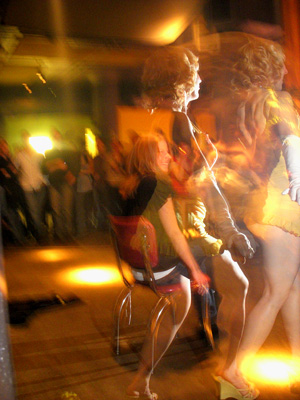 I nudge through the turnstile, putting the stiff yellow ticket in my pocket and crossing a footbridge to the other side of the tracks, where I head toward the cluster of women on the platform. It’s rush hour. Morning salutations compete with beehive intensity. I scoot forward and back. Soon, the Metro barrels up, and the women’s car, painted with a red stick-lady in a triangle skirt, sighs open.
I nudge through the turnstile, putting the stiff yellow ticket in my pocket and crossing a footbridge to the other side of the tracks, where I head toward the cluster of women on the platform. It’s rush hour. Morning salutations compete with beehive intensity. I scoot forward and back. Soon, the Metro barrels up, and the women’s car, painted with a red stick-lady in a triangle skirt, sighs open.
I shove and fold in with a throng of women heading to low-paying public sector jobs, or to clean expatriates’ houses such as mine, or to public school. Once inside, there is no need to hold onto the metal bars, already bombarded with curled hands, wrapped over and bullying each other. We are like books on a shelf, supporting each other’s weight.
A short woman, eyes looming behind a black mask, presses her gloved hands flat against my chest. I only see the eyes, dark and liquid–she is without a mouth or nose or ears or cheekbones or eyebrows. I look down the length of my buttoned blouse, to her fingertips, to my skin. Still, I can smell her sour breath, and she can probably smell mine. I find my hands and legs in immovable positions. Someone tentatively touches my hair, probably a little girl.
It is April, and hot. A single fan rotates. I can see the dust on its blades, and the windows are dingy and cracked, and through them the slums of Cairo whip by, the crumbling grey buildings, the jumbled sand and trash.
The back of my shirt grows slick. At each stop, more women force themselves in, and I begin to feel the pressure on my ribs, the itchy cloth of the woman in niqab against my bare arms. Even schoolgirls, writhing with giggles, are a burden to the rest of us. All is gravity and physicality. The Metro rattles into a dark tunnel, one weak bulb lighting the car. We might squeeze each other to death.
I was warned about taking the Metro in Cairo. My upper-class students had warned that there would be staring, pushing, insults. And that was just in the women’s car. I had heard stories of women taunting each other for the tint of their skin, of women in niqab shouting about Allah and bared flesh. Desperate women would sneak on the Metro without a ticket and peddle tissues and crumbling cosmetics for a few pounds. Cover your arms, said my students. Deny the American University, they advised.
I try to breathe deeply, my chest barely moving beneath the woman’s hands. I once heard a rumor about a study of Cairo’s traffic patterns. The Japanese scientists couldn’t figure out how it worked, how there weren’t multiple car accidents every second. I have learned to put faith in this inscrutability.
Some of the women look at me with frankness, but I cannot sense what they see. They cling to each other in something more than physical necessity. Most of them look tired.
Behind me, a fleeting space opens. I grapple for a handhold, clenching a breast, then a stomach. “Sorry,” I mutter.
Then a woman in lime-colored hijab says, “Welcome.” Her makeup is minimal, like mine. She wears a pantsuit, an oversized purse against her hip. She smiles.
When I respond in stilted Arabic, other women smile, eyes crinkling. The woman in niqab looks up. As we near Sadat station, a schoolgirl taps my shoulder to let me know it is time to start shoving toward the door, assuming, rightly, that I’m going to the university.
The car slows to the blur of hundreds of faces, hundreds of clamoring women. I try to stick with the schoolgirl as we push through women staying, women going, women trying to get on before others can depart. The woman with the lime-colored hijab prods me forward. As we pass, a Sudanese girl gets spun in a circle as easily as a rack of clothes, her braids flying.
A sea of women–we crest, then topple out, gripping each other, pressing, patting in a womanly empathy so familiar in Cairo. I can’t understand how I’m not falling, how I’m not getting trampled. I can’t understand how we carry each other in such smooth uncertainty. And all the while, women are laughing. I am laughing. We have this in common.
—
Amanda Fields‘ short fiction has been published in Indiana Review. She teaches at the American University in Cairo and co-blogs at www.bahgat-aly.blogspot.com.
photo by Sarah Truckey
